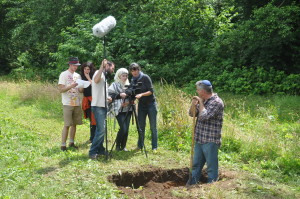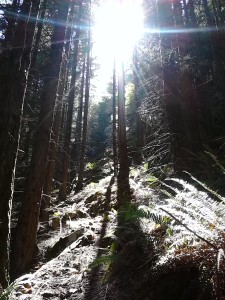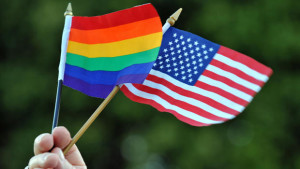
Today, a piece I wrote about the Israeli-Palestinian conflict was published in the latest issue of Christ and Pop Culture. A lot of media portrays this part of the world as being locked into a hopeless gridlock of violence, but this article explores a different narrative: the creative ways that ordinary people are promoting peace by bringing “enemies” together and building relationship (surprisingly, through amateur filmmaking). For now, the full text is only available through a paid subscription, or by downloading this single issue of the magazine, “Enemies Among Us,” for $1.99. Otherwise, I’ll be sharing the article here for free once it becomes publicly available in a few weeks.
In other news, I am now a Canadian permanent resident! It’s hard to describe the relief I feel in finally becoming an “official” person in this country who can work, study, see a doctor, or cross the border freely just like anyone else. My frustrating (but still privileged) experience as an immigrant has been fairly smooth, but it gives me a deeper appreciation for the profound anxiety and instability that mark the lives of the people I know who have come to Canada as refugee claimants, or as undocumented workers whose desperate life circumstances aren’t legally recognized as reasons for them to be here.
I found out about my new status in Canada just two days after returning from an 8-day silent retreat. When I had first told people I was going on that retreat, someone joked that the next step would be to take holy orders and become a Trappist monk. I laughed, knowing that at least in my case, silent retreats have nothing to do with being holy, and everything to do with wanting to be whole.
I went on my first (much shorter) silent retreat back in December out of a recognition of how much healing I needed. I was drawn towards silence by desperation. Despite my intense fear of being alone with myself—or with God—for more than three full days, a voice from somewhere inside me whispered that perhaps I was terrified of exactly the sort of space and stillness I needed in order to make peace with the sadness, fear, and anger that I was more or less able to keep at bay in daily life. Part of me knew that I needed silence.
I surprised myself by feeling reluctant to leave at the end of that first retreat. Me, the talkative, task-oriented extrovert who had done almost nothing for the better part of five days except sip tea, stare into the fire, and have long conversations in my mind! If anything, my longing for unbroken communion with God in the space of long, quiet days had only intensified, and I committed to going on a much longer retreat later in the year.
By the end of July, however, the part of me that had voluntarily signed up for more than a week away from normal life felt small and faint; insignificant in comparison to the part of me that was content with the day-to-day activity which often crowded out the desire for stillness, or even prayer. With travel to and from the small island where it would be held, the retreat meant spending the better part of 10 days away from Andy—by far the longest we have ever been apart during the six and a half years of our relationship—and it involved not just being away, but being completely out of contact, with everyone.
“What’s your intention for the time?” a friend asked me a few days before I left. “I don’t know,” I answered, fear rising up inside me. Wait, I don’t know why I’m going on this retreat, I thought franticly. Should I even go? I briefly considered cancelling, but couldn’t come up with a good excuse.
And yet, when I arrived, it felt like coming home. There’s so much I could share about my experience, but much of that new growth is still so raw and tender, this is the internet, and there’s only so much you can really describe to others about your deepest , most intimate, inner life anyway. I will say that the hardest thing about being in silence is not the absence of speaking, but all the emotions and thoughts and memories that come up when you spend that much time alone with yourself, without even the distraction of basic social obligations like eye contact and verbal greetings.
On the first day, the person I was meeting with for spiritual direction gave me a poem by Rumi called The Guest House:
This being human is a guest house
Every morning a new arrival.
A joy, a depression, a meanness,
some momentary awareness comes
as an unexpected visitor.
Welcome and entertain them all!
Even if they are a crowd of sorrows,
who violently sweep your house
empty of its furniture,
still treat each guest honorably.
He may be clearing you out for some new delight.
The dark thought, the shame, the malice,
meet them at the door laughing,
and invite them in.
Be grateful for whoever comes,
because each has been sent
as a guide from beyond.
I had ridden a wave of circumstantial happiness out of Vancouver, and I reflected that perhaps now I would have the chance to find out what it was like to spend time with God in silence while in a fairly peaceful, even-keeled condition instead of in the midst of emotional turmoil. But eight days is a long time, long enough for turmoil to ensue and subside, and ensue again.
Little did I know that one of the greatest gifts of my retreat would be having enough time to weather those internal storms, and to see that however intense or scary they might seem, they didn’t wash me away. I didn’t exactly manage to “meet them at the door laughing,” as Rumi advised, but after spending a few hours or a whole day in the company of shame, or anger, or sadness, or self-doubt, the “visitor” would inevitably leave and I would still be there. So would God.
The peace that I felt at those times was profound. It wasn’t the usual, flimsy happiness that depends on things going well or turning out a certain way; nor was it the conditional self-acceptance that often follows having done something well. It was that deeper awareness of the bedrock reality that the world is permeated and sustained by Love, that I am loved, and that ultimately—as medieval mystic Julian of Norwich writes—“All will be well, and every kind of thing will be well.”
In a way I couldn’t possibly have planned, those days in silence seem to have marked a boundary line between two seasons in my life: a slow season of processing my transition from India and focusing on my own healing, and a more active season of engaging with the world more fully again. Not abandoning prayer and stillness, or having it all together, but, you know, finding a paid job. Etcetera. I’m excited to see what this new season brings, but I am also thankful for all of the hard-won lessons I will carry forward from the season behind me.

